Rumours swirl and disquiet grows as locals says G7 is ‘last thing Cornwall needs’
Residents question environmental destruction, disruption and sheer astronomical cost of summit - which will see world leaders ensconced in luxury hotels minutes from some of UK’s most deprived areas, Colin Drury finds in St Ives

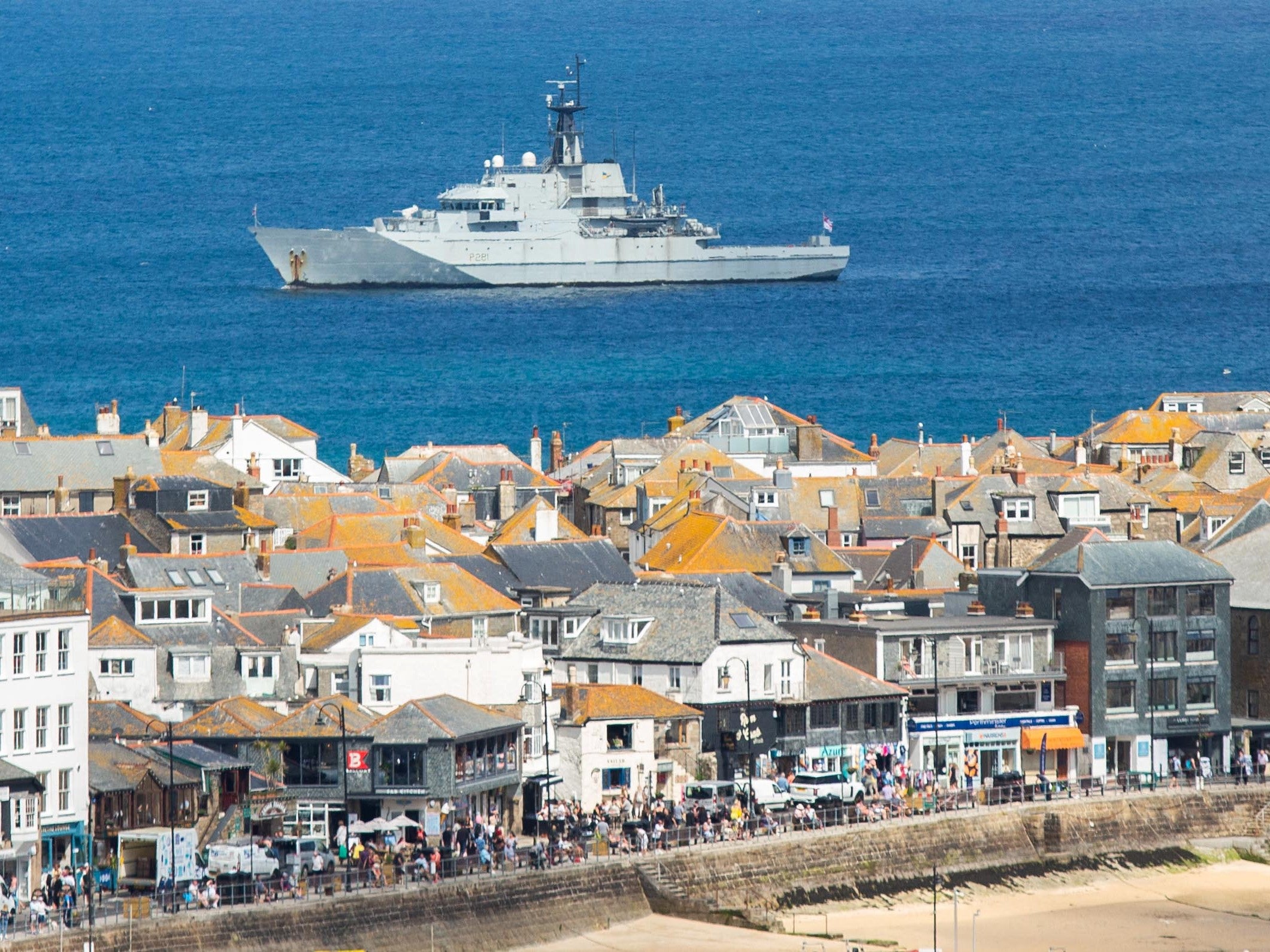
Two days until the G7 summit begins in the seaside village of Carbis Bay, and in this corner of Cornwall – a holiday idyll fast resembling a military Green Zone – rumours are rife.
One doing the rounds suggests surface-to-air missiles are to be installed somewhere behind the local cricket club. Another has it that American warships will soon join the British naval vessel which has already appeared off Porthmeor Beach. There’s a story that one chip shop has received an order for a thousand fish suppers on Friday night.
Leaders of the world’s seven biggest advanced economies – including US president Joe Biden and Germany chancellor Angela Merkel – will be here and in neighbouring St Ives for diplomatic talks this weekend.
And whatever the truth of the above gossip, one thing is certain: the reality is just as surreal. This is a tourist resort that increasingly feels like an occupied enclave.
Armed police are everywhere. Road check points have appeared at various intervals. Military grade fencing – steel, 10ft high and reinforced with concrete blocks – has sprung up across town. Residents on one quiet street have had their entire road fenced off because it backs onto the castle where world leaders will stay. “They’ve built a cage round us,” Christine Towner told The Independent.
Hour after hour, huge articulated lorries trundle down these tight Cornish roads. They bring diggers, cranes, building materials, security equipment and manpower. In a place where getting phone reception can be a challenge – and 5G more or less mission impossible – residents reckon they have never seen so many BT Openreach vans.
Every single drain here has been checked, sealed and serial numbered. The only railway line into town is to be shut down, while 44 separate footpaths have been closed off – and will remain that way for a week after this whole circus finishes. The roads – in decent enough nick anyway – have all been re-tarmacked. “Forget rolling out a red carpet,” one resident notes, “we’ve laid out a black one.”
Just outside St Ives, a sprawling temporary barracks has been built in a farmer’s field. It remains unclear who exactly will be staying here but, presumably, it’s not anyone considered worth impressing. While Biden et al will be put up at the luxury Tregenna Castle (sea views, sub-tropical gardens, on-site golf course), the billets here do not appear to even come with their own toilets. Its communal loos all round. Ironically, perhaps, given this is thought to be a police or security base, only a few fields away is the site where thousands of Extinction Rebellion protestors will be camping.
The disruption does not end there. It is spreading across the entire county. Thirty miles away in Falmouth, parts of the town centre will be cordoned off to make way for the event’s media centre. Roads surrounding Newquay Airport are being closed. The whole of Cornish air space has already been shut down.
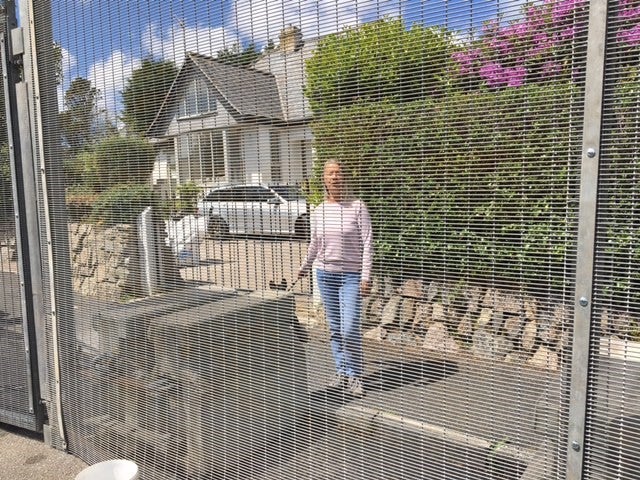
This, in short, is the full awesome and slightly terrifying power of the state on display.
In the midst of a pandemic and in a town that, by and large, does not appear to want this to be happening, orders have been sent out from London and, without any form of appeal, disrupted countless lives and livelihoods here.

What do Carbis Bay and St Ives – beneath the surface, an area of acute inequality – receive in return for such disruption? Not a lot is the simple answer.
There is no section 106-alike funding to sweeten the carnage caused by hosting world leaders. Tens of millions of pounds may have been spent on security and temporary infrastructure but what the government cannot stretch too, it seems, is making cash available for, say, improving the local school that is based in a 70-year-old building or reopening the much-loved Edward Hain Hospital – closed to inpatients last year because new fire doors were deemed too expensive for the NHS.
“If you look at the grass verges, they’ve all been replanted with flowers,” says Neil Scott, a trustee of the St Ives School of Painting and coordinator of the town’s Extinction Rebellion group. “As far as I can tell, that’s the legacy project.”
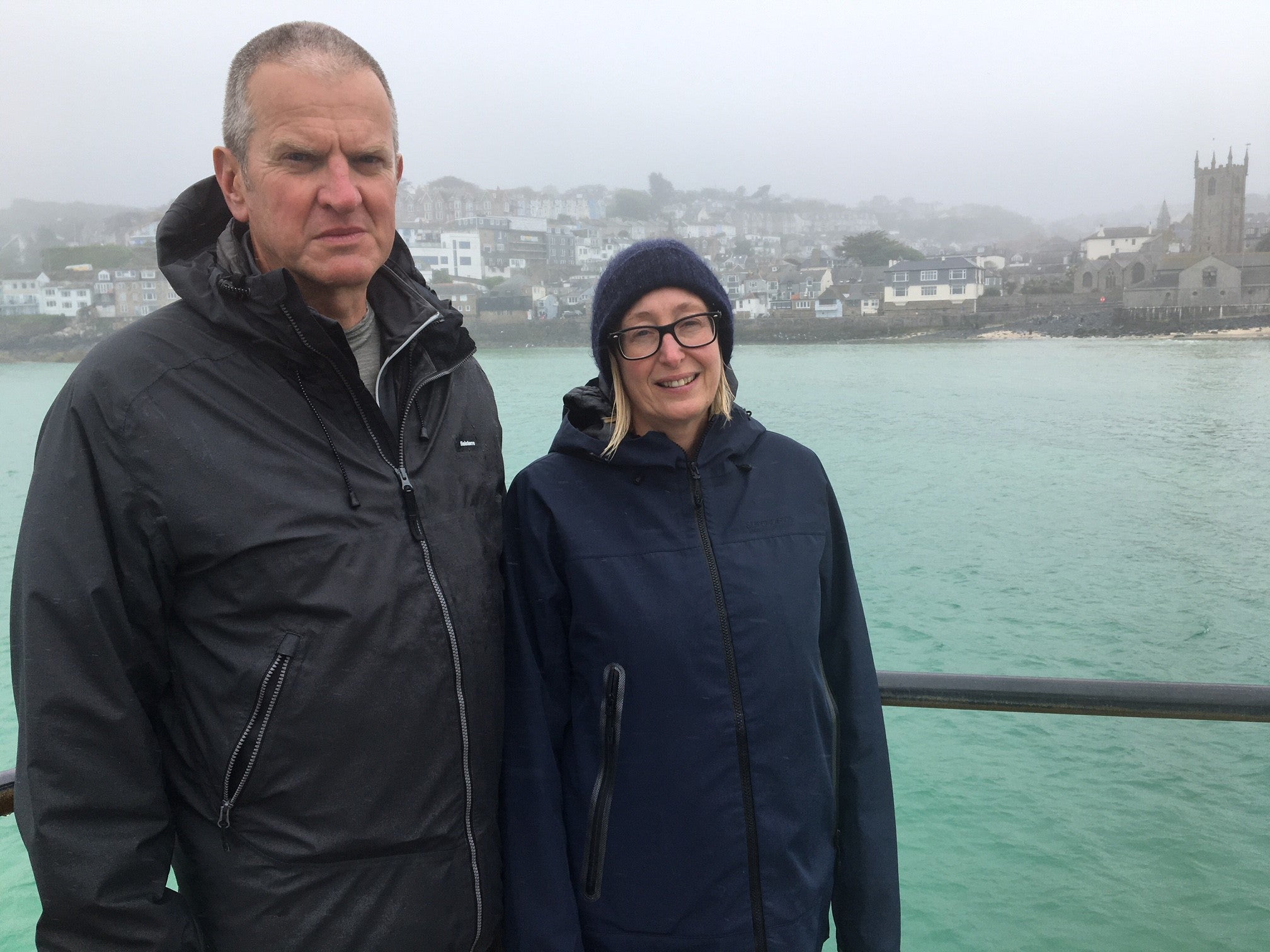
When Carbis Bay and St Ives – combined population: 14,000 – were first announced as the venue for the G7 talks in January, there was no shortage of raised eyebrows.
“I heard it on the Today programme while I was half asleep,” says Sam Parsons, a journalist and mother-of-two who has since become a coordinator for the area’s ResistG7 protest movement. “I thought I was dreaming it. We haven’t got enough money to get buses to run on time in Cornwall but suddenly they’re improving the roads for Joe Biden’s cavalcade? What?”
Parsons notwithstanding, perhaps, the initial sense among many here was one of bemusement but also excitement. “Wouldn’t it be amazing if Angela Merkel came and had a trip out on one of these?” Glenn Eldridge, owner of Ocean Sports Centre, asked the Guardian in January while pointing out a Hawaiian canoe.
Yet, as the reality of hosting the summit has become clearer in the months since, feelings have hardened.
One complaint, in particular, is raised time and again: the sheer incongruity of so much taxpayer money being lavished on a three-day event in what is, despite pockets of affluence, the poorest region in England. Almost a third of children in St Ives live in poverty, while, across Cornwall, annual wages are £4,000 below the national average. Against this backdrop, the summit’s security bill alone is estimated to top £70 million: some 5,500 police officers and hundreds of army personnel will be here.
We haven’t got enough money to get buses to run on time in Cornwall but suddenly they’re improving the roads for Joe Biden’s cavalcade?
“This is a community that has suffered with under-investment and deprivation for decades,” says Gill Scott Anderson, wife of Neil and co-founder of the town’s Community Pantries food share programme. “So, to suddenly see this influx of money on things like policing and tarmacking – things that offer no real long-term benefit for people here – it’s galling. How can you justify those kind of sums when you have children going hungry literally up the road? What happened to levelling up?”
The local councillor here, independent Andrew Mitchell, puts it another way. “A class of 10-year-olds could have come up with better ways of spending this money so it benefited more people,” he declares.
The counter-argument – put forward by the government and the Conservative-run Cornwall Council – is that the diplomatic jamboree will give the whole region the kind of planet-straddling exposure money cannot buy. “They will see us,” says Mayor of St Ives Kirsty Arthur “as an international global stage.”
A class of 10-year-olds could have come up with better ways of spending this money so it benefited more people
Yet businesses here are sceptical.
“It’s Cornwall in the middle of summer,” says Jo Cooper, owner of the seafront Pels of St Ives café. “We don’t need a photo of Boris Johnson having an ice cream to convince people how amazing the place is. They already know. We’re over-saturated every summer anyway.”
Many businesses, indeed, fear the whole weekend and much of next week will see significantly reduced revenues. With so much disruption, so many no-go zones and so many police walking around, the concern is that holiday-makers and day-trippers will stay away. Some shops and eateries are closing for the duration.
“We’ve just come out of lockdown,” says Cooper, a 47-year-old mother-of-two. “This is pretty much the last thing we needed.”
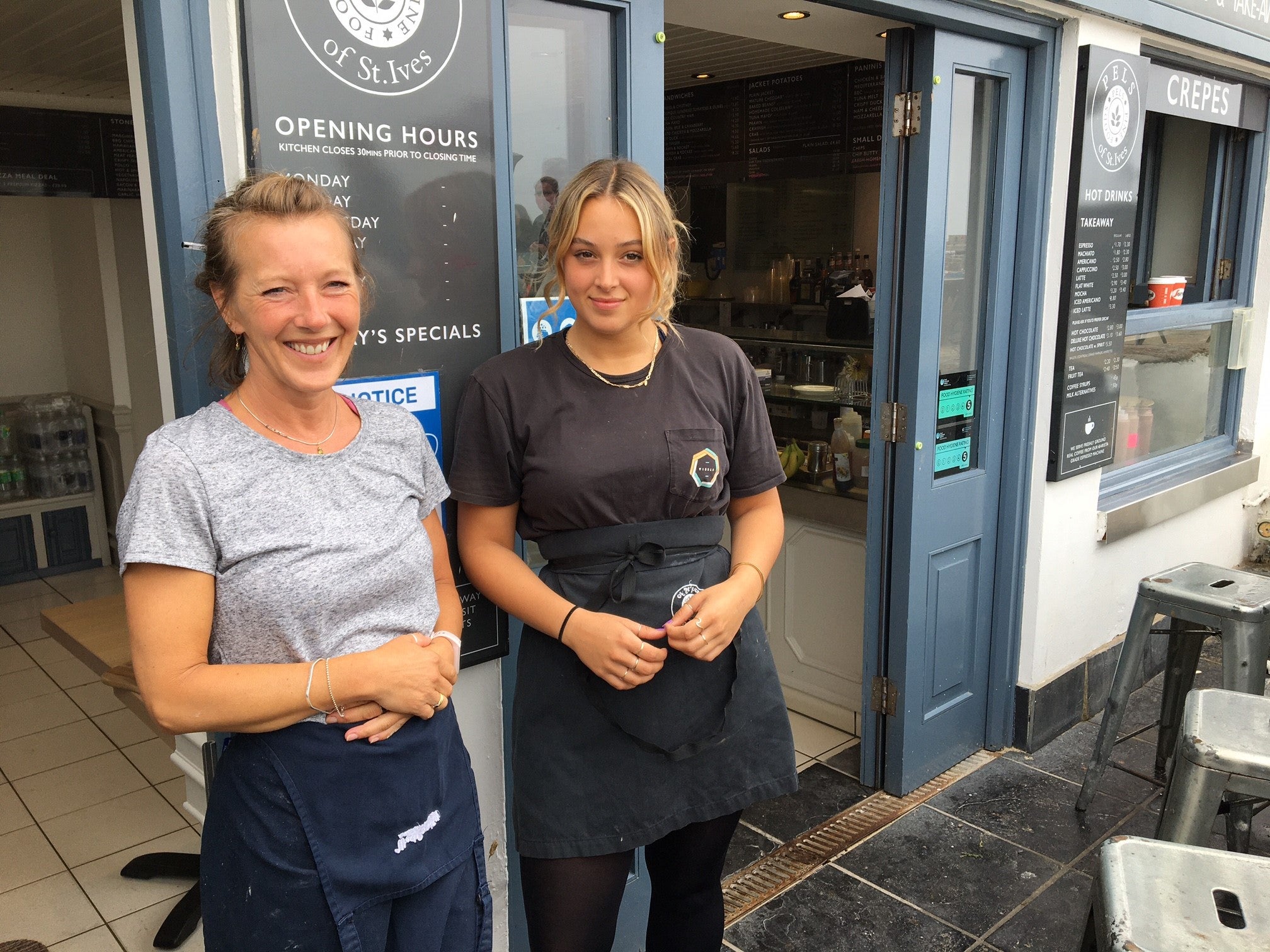
The local environmental damage, too, has become a totemic concern.
While the climate crisis is set to be one of the summit’s main agenda points, many here are aghast at the destruction being caused in preparation for the event.
In a move almost beyond parody, the Carbis Bay Hotel, which is hosting the actual talks, has cut down trees to build new meeting rooms (done without planning permission); while the sheer volume of traffic suddenly appearing in the area has raised questions about the event’s carbon footprint.
“You’ve got lorries everywhere and Chinooks buzzing about in the sky,” says Rob Higgs, a mechanical sculptor and co-founder of Ocean Rebellion, based in nearby Penryn. “This is before your world leaders even arrive. It’s an ecological nightmare happening right in front of our eyes. They say they care about this stuff. Do they really? Then why aren’t they doing this on Zoom?”
Not everyone is against the summit, it should be said.
Derek Thomas, the Conservative MP for St Ives, West Cornwall and the Isles of Scilly, reckons that “if you took a straw poll most people are excited about the spectacle”.
While Cornwall may not need more tourists, he points out the international recognition could drive up exports from the region.
In the St Ives hardware shop he has run for 54 years, meanwhile, Colin Nicholls reckons it can only do his home town good to help facilitate an event that could, ultimately, help the world both become greener (initial hypocrisy not withstanding) and recover from Covid-19.
“All this disruption,” the 74-year-old great grandfather and former councillor says. “It will disappear like vapour in the air come next week. And then we’ll get back to normal knowing our town has been at the centre of this very important moment.”
What would he say if Joe Biden popped in to the store, called Colenso, for a screwdriver or such like? “I’d suggest less talking [at the summit] and more action,” comes the reply. “I’d say get that vaccine out round the world and let’s put that to bed for starters.”
Sage advice, perhaps.
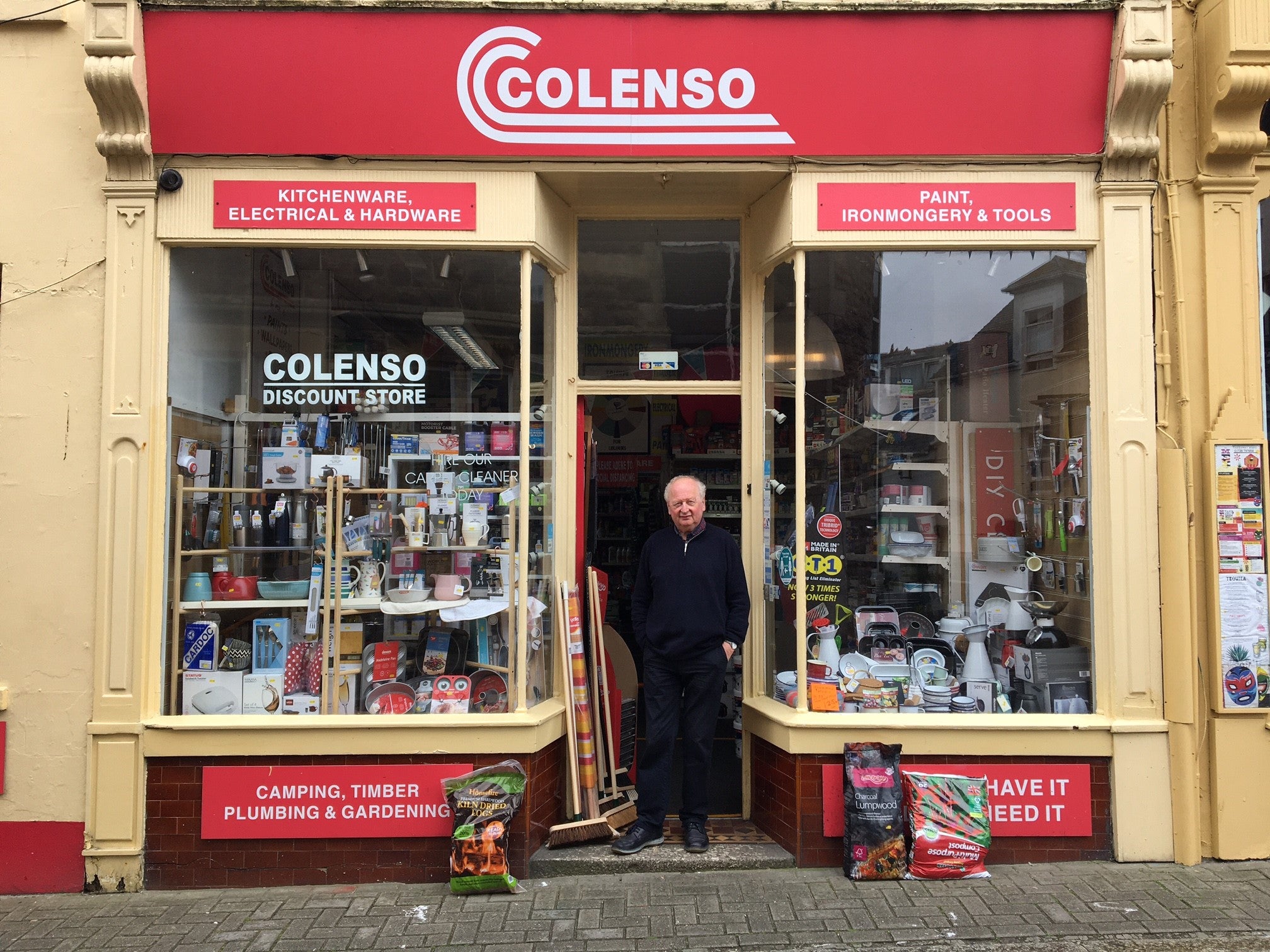
Yet whatever the global good that may or may not arise from this weekend, it cannot disguise the sense that this particular corner of Cornwall has the feel of an area about to be short-changed.
Back with Neil Scott, standing on Smeaton’s Pier, reflecting on all of this.
“It’s ego-stroking to think that your town is being shown off because, hey, we all know it’s the most beautiful place in the world,” he says. “But St Ives isn’t just about beauty. There’s real grinding hardship here. And when this whole military encampment has been taken down and the armoured cars have all gone and Boris Johnson is back in Downing Street, that hardship will still be here. None of this will change that.”
Join our commenting forum
Join thought-provoking conversations, follow other Independent readers and see their replies
Comments
Bookmark popover
Removed from bookmarks